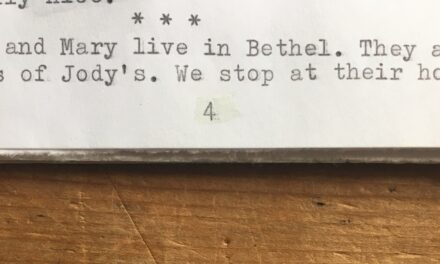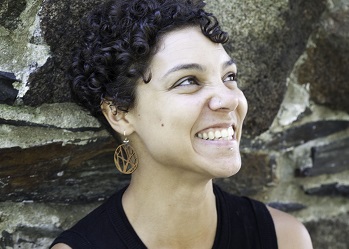For today’s post our nameless blogoscribe has taken five comments from contributors to Issue 8.2 and arranged them into a surreal pseudo-mini-narrative. If you read it and then tonight wake up having dreamt of being chased by a tumescent elephant into the arms of an existential yet not unpaternal birch tree with a penchant for inappropriate laughter, well, you’re probably going to have a little trouble getting back to sleep. The anti-dote: order Issue 8.2 here.
Josiah Bancroft (on his poem “My Name”): I’m not one for out of body experiences or astral projection and the like, but I have experienced the occasional dissociative moment when some regular fixture of my life suddenly seems alien. Most remarkable is when this happens while I’m staring in the mirror or upon hearing my name called. That something so essential can become novel is wonderful and frightening. I think most people are familiar with that seasick feeling, that out-of-memory experience. It’s the quintessential American identity crisis: “This is not my beautiful wife.”
Ryan J. Browne: “Theory of must” is one in a series of “theory” poems in which I try to go by the words of Lucille Clifton: “Poems do not come from what you know; they come from what you’re trying to wonder about.” One day, I read somewhere about elephants hearing through their feet, not their ears, and, after some research, I had the bare bones of a new poem. During my reading, I saw the state of sexual arousal of bull elephants is referred to as musth. Well, I had a draft of a poem, “Must,” that was about a first date, not elephants, and had been set aside for some time. The next move seemed obvious. It was one of those happy coincidences—work giving life to work!
Sandy Longhorn: In June 2010, I set out to write a poem a day for 14 days and drafted “Litany for the Insomniac” on day 13 of that run. My journal claims “not sure there’s enough left for today and tomorrow” and states that I had slept poorly the night before. The poem went through many rewrites over 6 months, as list poems can be tricky and must be crafted not only for sound, meaning, and image but also for pacing in the movement toward closure. The opening couplet remains intact save one word change.
Lloyd Schwartz: I once got a review that compared me to the comedian Henny Youngman, which delighted me, because I want people to find humor in my poems (though not just). One of my favorite essays is Thomas De Quincey’s “On the Knocking at the Gate in Macbeth,” in which he writes about Shakespeare’s use of comedy, the famous drunken Porter scene in Macbeth, not to soften but to heighten the surrounding tragedy. I’ve been working on some poems recently that are trying to explore the relation between the comic and the serious. “Cut-Up” is based on a true story. My oldest friend, one of the funniest people I know, told me a horrendous story about one of his sons. So awful that it made me want to scream—or laugh. The way we sometimes laugh at the scariest horror movies.
Thinking about my reaction to what my friend was reporting reminded me of a production I was in—in fact, the American premiere of Ted Hughes’s translation of Seneca’s Oedipus. It’s a much grislier affair than the greater and more famous Sophocles version. I was a member of the Chorus. The director, Laurence Senelick, was trying to figure out how the townspeople would respond to the horrible news about Oedipus. He had the inspired idea to have each of us begin with a little chuckle or snicker, as if this had to be a joke. Then as each Chorus member heard the others, the laughter increased until it virtually exploded into a kind of mass hysteria. People in the audience told me afterward that it was one of the most chilling theatrical moments they’d ever experienced. And we on stage were feeling the same thing. It was much more powerful—and seemed more “real”—to laugh at a situation that was too horrifying for predictable tears. I’d wanted to get that experience into a poem for a long time.
G. C. Waldrep (on his poem “Common Prayer”): Friendship is also a harrow, one of the more complex scars experience leaves on a body. Track or trace, both from the Latin trahere, to drag. To cultivate, in an open field: one imagines an open field: and this is the nub of it, the crux, the punctum: one imagines. The field itself; one’s place in it; the harrow’s sharp teeth or revolving discs (pick your century), each a miniature Klein bottle, a dream-planet’s silhouette bright in the noonday sun. To disturb keenly or painfully, as the mind, feelings, etc. Sometimes, when I read my poetry aloud—I mean to others—I’m asked, “who is the you that keeps showing up in the poems?”
In Tolkien’s Smith of Wootton Major, the enchanted Smith “put his arms about the stem of a young birch and clung to it, and the Wind wrestled fiercely with them, trying to tear him away; but the birch was bent down to the ground by the blast and enclosed him in its branches. When at last the Wind passed on he rose and saw that the birch was naked. It was stripped of every leaf, and it wept, and tears fell from its branches like rain. He set his hand upon its white bark, saying: ‘Blessed be the birch! What can I do to make amends or give thanks?’ He felt the answer of the tree pass up from his hand: ‘Nothing,’ it said. ‘Go away! The Wind is hunting you. You do not belong here. Go away and never return!'” The birch is right. We do not belong here. And yet in this world there is no “away.” And no return.










